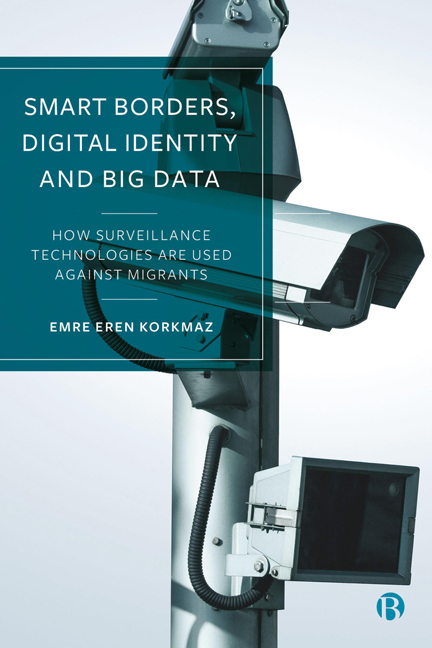 Smart Borders, Digital Identity and Big Data
Smart Borders, Digital Identity and Big Data Book contents
- Frontmatter
- Dedication
- Contents
- List of Abbreviations
- About the Author
- Acknowledgements
- Introduction: Canaries in the Coal Mine
- 1 Migration and (Surveillance) Capitalism
- 2 Migration and (Big) Data Analysis
- 3 Smart Borders
- 4 Digital Identity and Surveillance Capitalism
- Conclusion: How Can We Resist?
- Notes
- References
- Index
2 - Migration and (Big) Data Analysis
Published online by Cambridge University Press: 27 March 2024
- Frontmatter
- Dedication
- Contents
- List of Abbreviations
- About the Author
- Acknowledgements
- Introduction: Canaries in the Coal Mine
- 1 Migration and (Surveillance) Capitalism
- 2 Migration and (Big) Data Analysis
- 3 Smart Borders
- 4 Digital Identity and Surveillance Capitalism
- Conclusion: How Can We Resist?
- Notes
- References
- Index
Summary
The analysis of (big) data has exciting potential in the fields of migration and border management and humanitarian emergencies, as in many other fields. The reason I place ‘big’ in parentheses is that the definition of big data keeps expanding in quantitative terms. Therefore, it might be sufficient to simply talk about data analysis. Two issues make data analysis especially valuable. First, data sets that are too large for humans to analyse unassisted can be evaluated using AI algorithms thanks to advanced statistical applications. Second, with advances in cloud storage, it becomes possible to hold and use large data sets, without data going to waste.
What makes this analysis exciting, specifically for the issue at hand, is that inferences made from data sets allow us to analyse the basic characteristics and dynamics of mass movements and make predictions about the future (Bozçağa and Cansuna, 2022; Gürkan et al, 2022; Solano, 2022; Weber, 2022). The business model of surveillance capitalism, discussed in Chapter 1, is also based on the assumption that similar phenomena, under normal conditions, should lead to similar expectations. This, in turn, offers new opportunities for making projections about migration movements and analysing applicants to cross borders. Examining data from previous applicants and categorizing new applications using this framework make it possible to make judgements about whom to allow to migrate and where.
Capitalist companies’ dominance over big data
The biggest concern, for the purposes of this study, is that a significant portion of the main actors that collect and analyse data from migrants are capitalist companies. States, UN agencies and humanitarian aid organizations also collect data from migrants and refugees, but the field is dominated by a small number of companies. Mobile phone operators, financial firms, digital platforms, social media providers and companies that operate search engines and offer translation and navigation apps collect real-time data from migrants on a continuous basis. Using this data, they offer products and services to practically everyone, regardless of whether they are migrants are not. For example, as a Turkish-speaking migrant in the UK, I am usually shown ads for remittance companies when I use social media or search engines.
- Type
- Chapter
- Information
- Smart Borders, Digital Identity and Big DataHow Surveillance Technologies Are Used Against Migrants, pp. 46 - 67Publisher: Bristol University PressPrint publication year: 2024


